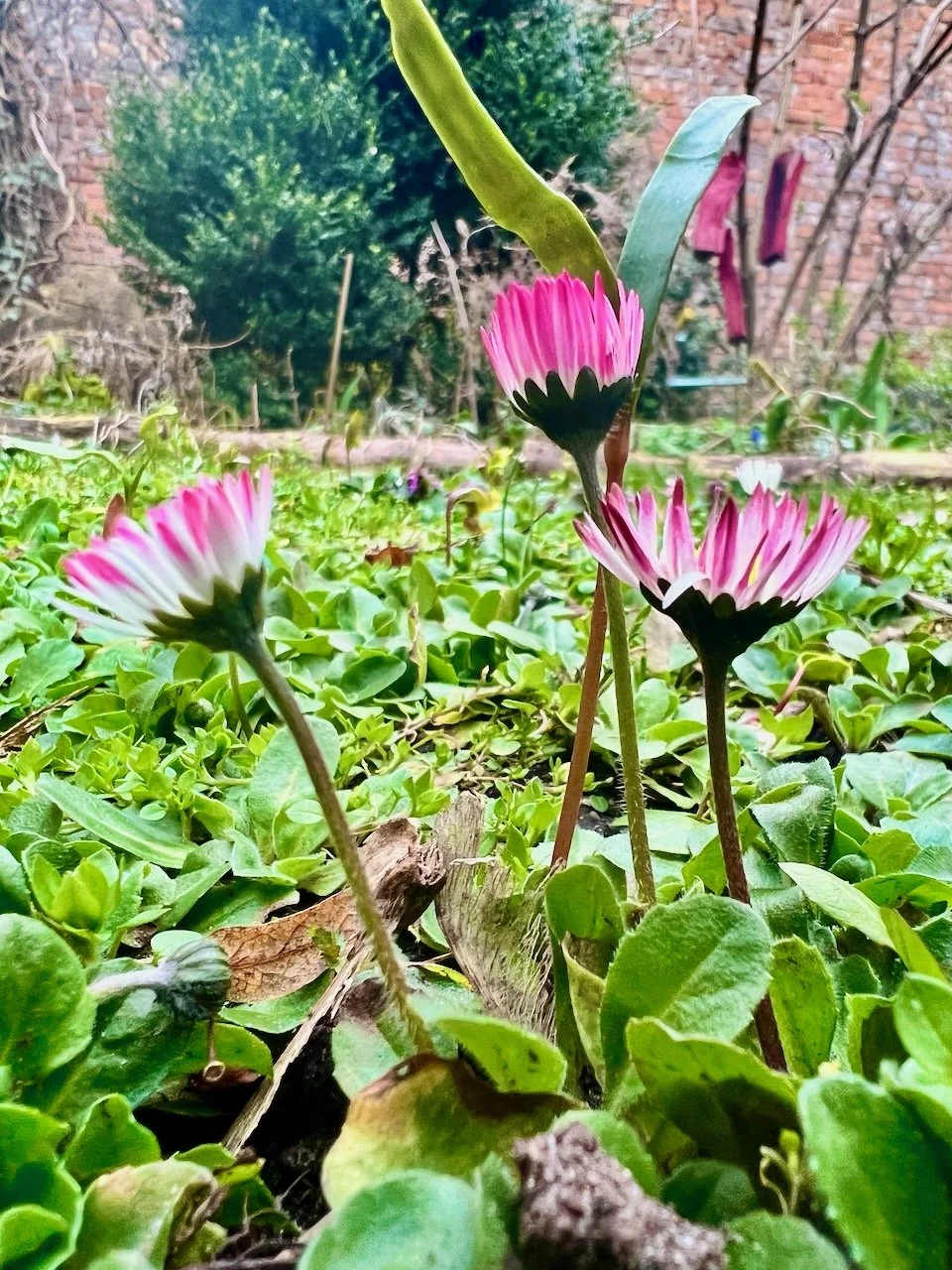Dear One,
With this Spring photo from our cloister garden at the city cloister in Berlin, our sabbatical home, I greet you and send you peace. Welcome to our Passion Week Consolations. This journey is for you. You can walk along with us every day, you can read the whole consolation or just skip to the music. Or you skip the music and just read the reflections. Or you go right to the blessing or meditate on the lead photo. You can follow along every day or walk in and out or take time on Holy Saturday for your private retreat visiting or revisiting our consolations. However you journey, it is not important how much you do, but rather that it moves your heart.
On the Art of Repetition
As therapists we know there are repetitions that are quite bad. We repeat old programs, schemas for instance that haunt us and are in the way of new and more wholesome experiences.
But in the end even these haunting repetitions can become sign posts which call out to us for change.
Then there is repetition which is inherent to any kind of spiritual practice. The church year repeats itself time and again, mirroring the seasons of the year. Bach’s Passion music is made for exactly this kind of repetition. We listen to the same piece every year and every year it moves us differently.
The spiritual life lives from repetitive practices: prayers, feast days, church seasons, candle lighting. The monastic life breathes in these repetitions. Every weekday, here in Berlin, we meet at chapel to chant psalms. At the same times. Often the same texts. It offers what Saint Benedict names stabilitas. A sense of belonging in a complicated world.
Thus, this passion journey will be a repetition, too. Not so much perhaps if you travel the first time with us. More so if you have been with us before. You will by now know the movement of soul from leaning into our sorrows towards Easter hope. You will know some of the pieces we will listen to. Or they might seem new to you again. We still listen to Bach, we still start with the same entrance choral. And still we listen to it anew.
I guess anew is the important word here. Listening anew is at the heart of the kind of repetition which helps us deepen ourselves. Listening to the same old tunes and still listening anew.
Therefore I write every year anew. To make sure to walk the walk with you and along side you. And so I will listen anew, at a different place, with different ears than last year. I might chose some different pieces and I might stay with some of the old, just because they make the Matthew Passion the Matthew Passion.
Every day I will start out with a personal reflection, then introduce the piece, meditate on the theme, then invite you into a listening practice, offering you some deepening questions and as always finish up with a wine, ups, I mean a blessing :-) You can bring the wine. It will be fine. We are not purists here. We are pilgrims.
After all we are on a pilgrimage. We start at the same place and we probably even walk the same road. And we will be challenged and changed just as we have been last year.
Lamentation is such a practice of repetition. Passion Week is just that. It invites us into a great lament. Not for self flagellation but for self discovery. Just as we clean house in Spring, Passion Week does the same to our hearts. This is how Bach starts his grand Matthew Passion. And this is the piece we also will listen to today. So let us start our journey with Bach’s great Lament.
“Come, ye daughters, help us lament. ”
On the power of Lament, or: To break one self open…
With his Passion JS Bach has created a grand lamentation. His music gives us a container for our sorrows and seduces us into beautiful lamentation. Lament is not despair. Joining in this orchestrated experience of mourning can actually be self-soothing and a strategy for resilience in the face of tragedy.
This is what the opening chorus of the Passion does. “Kommt, ihr Töchter, helft mir klagen…”. literally translated with “Come ye daughters, help me lament…” In broad strokes, bringing together both choirs, all the soloists and instrument groups, Bach weaves together movements which penetrate our soul and make a path to participate in Christ’s suffering by facing our own.
Daughters and Sons, sisters and brothers, what are we bringing to this lament this season? Here we are at a new stage of our life. With joy and sorrows collected over the year(s). With open questions and our longing for wholeness. Here we are burdened by the state of the world, daily news of war and mass murder, at the verge of Spring. Here we are, even angry may be, with things we cannot change and what life has thrown our way.
If we trust the biblical stories, lament seems to be a significant part of the human story with God. There are the famous lamenters like Job and the psalmists, and even one book called Lamentations. What are they doing in our bible?
Lamenting understood correctly is a healthy form of grieving. Instead of locking us up within our grief we give words to our sorrows and in doing so we free them from the grip of despair.
Listening Practice
The St Matthew Passion performed by the Netherlands Bach Society for “All of Bach.”
You can watch the video also directly on their beautiful website, scrolling through each piece. Here you also find text translations and back ground information on this recording.
> The piece we meditate on today is the very first entrance chorus: “Kommt Ihr Töchter, lasst uns klagen…” (If the video does not start at the beginning just scroll the red line at the bottom back to the beginning.)
So today I invite you into lamentation. To listen to it. And then, to bring your own words to it. Start with the opening chorus of the Matthew Passion. Listen. Listen with the ear of your heart. You probably do not even need the lyrics to understand the motions. Feel the movement, as Bach composed them like waves, rolling over the choirs and orchestra, almost like a mourning dance,
Come ye daughters, help me mourning, see him, whom? the Christ, see him, whom?, the lamb, see, what? the patience , Look, where? on our guilt, he is bearing, out of love, to the cross.
How to listen to Bachs music? There are several ways: Just start and listen to it once. You might want to read the text first and then listen, or the other way around, or follow it while listening. You might want to listen to the piece now once, and once again at the end of your day. Or during the day. As the spirit moves you.
For today we want to listen together to the opening chorus of the Passion. It is almost 8 min long. So you have to turn the video off (which is the whole Passion) after the first piece. Or you might listen a little longer to get a feel for how it is bound into the passion story. Or you listen to the whole thing :-)
1. Chor (I, II)
Kommt, ihr Töchter, helft mir klagen,
sehet – Wen? – den Bräutigam,
seht ihn – Wie? – als wie ein Lamm!
O Lamm Gottes, unschuldig
am Stamm des Kreuzes geschlachtet,
Sehet, – Was? – seht die Geduld,
allzeit erfunden geduldig,
wiewohl du warest verachtet.
seht – Wohin? – auf unsre Schuld;
All Sünd hast du getragen,
sonst müssten wir verzagen.
sehet ihn aus Lieb und Huld
Holz zum Kreuze selber tragen!
Erbarm dich unser, o Jesu!
1. Chorus
Come ye daughters, share my mourning;
See Him! Whom? The Bridegroom Christ.
See Him! How? A spotless Lamb.
O Lamb of God unspotted,
Upon the Cross Thou art slaughtered.
See it! What? His patient love.
Serene and ever patient,
Tho’ scorned and cruelly tortured.
Look! Look where? On our offence.
All sin for our sake bearing,
Else would we die despairing.
Look on Him. For love of us
He Himself His Cross is bearing.
Have pity on us, o Jesus.
Deepening Questions
While listening, be mindful of
how the movements of the music call to your soul
the invitation to mourn
the expression of emotion in voice, posture, and music
Going deeper: Lamentation Practice
If you have the time, continue to meditate over the day on your own lamentations. What are you mourning today? What is the cross you bring to this place and time? How can you give words to it? Perhaps you want to write a lamentation psalm, just as the psalmists did. Or, more simply, list your lamentations on a piece of paper. How ever you do it, one way to end this practice is to bring the lamentations you have written or moved in your heart and sit with them while you revisit the entrance chorus in the evening again. This time, while listening, fill the lyrics in with your own words.
A blessing
At this beginning of passion season
be consoled
by the hope
that the God who suffers
along side us
prescribes lament
as remedy to our sorrows
and as pilgrimage to hope.
May Divine consolation
wait for you.
Now and always.
Amen.
AF
This post is the 1st of our Passion Week Consolations 2023. You can still subscribe here. To enter our virtual gathering space click here. To share your thoughts with us, write us here or comment below. To offer your Gift, click here. If you are looking for personal consultation, visit our PathFinder.
Peace and Blessings, Almut & Chuck



